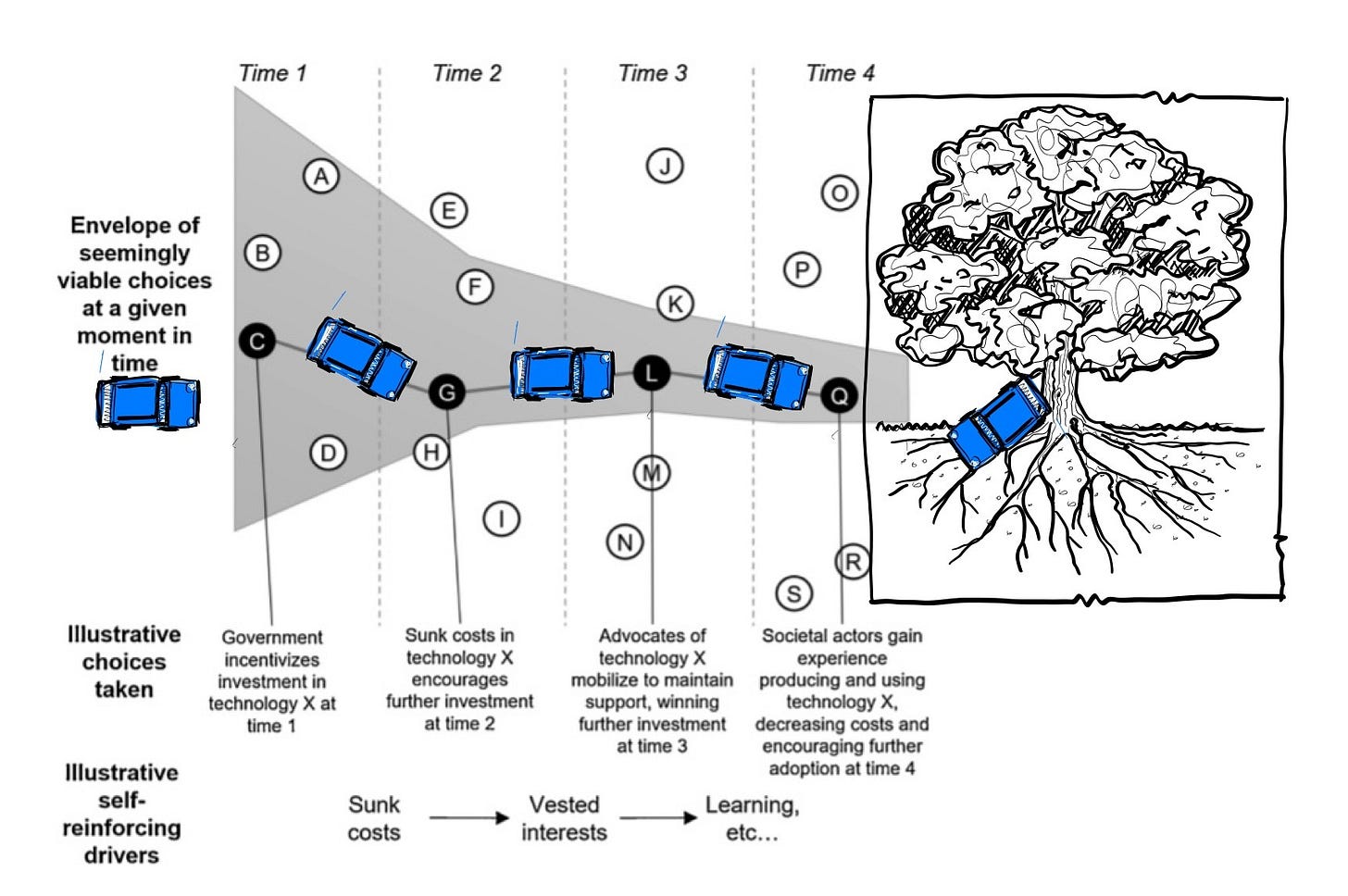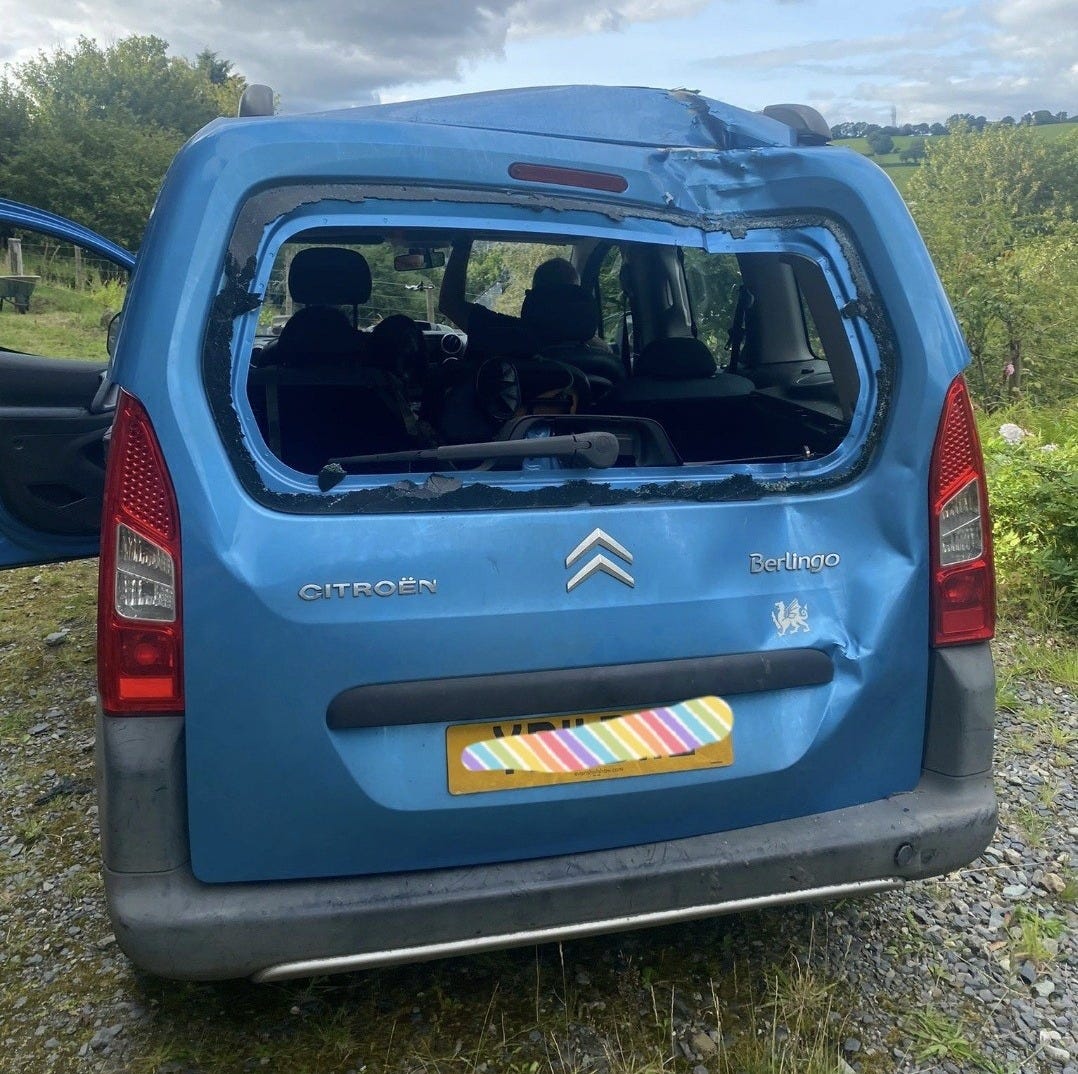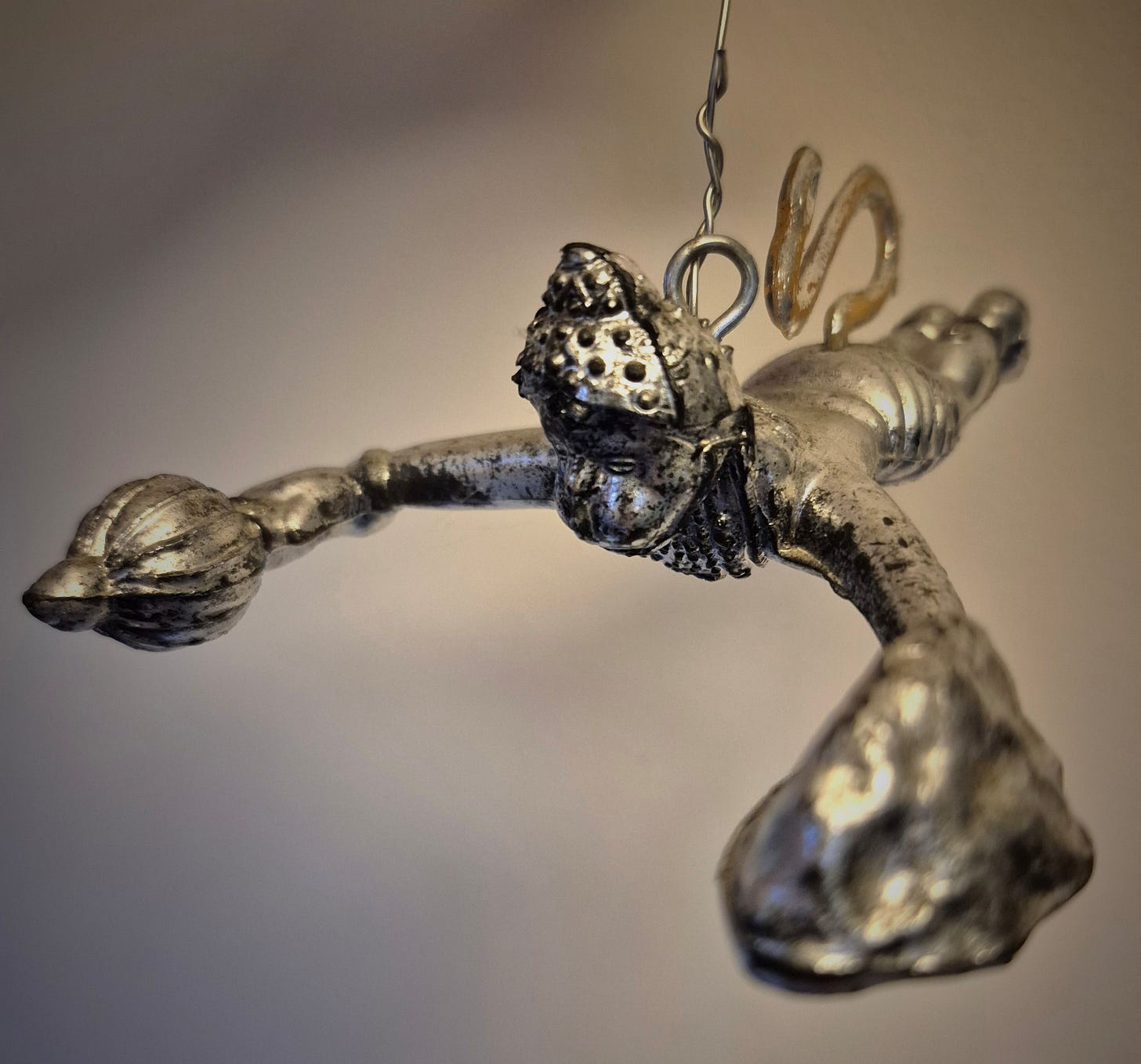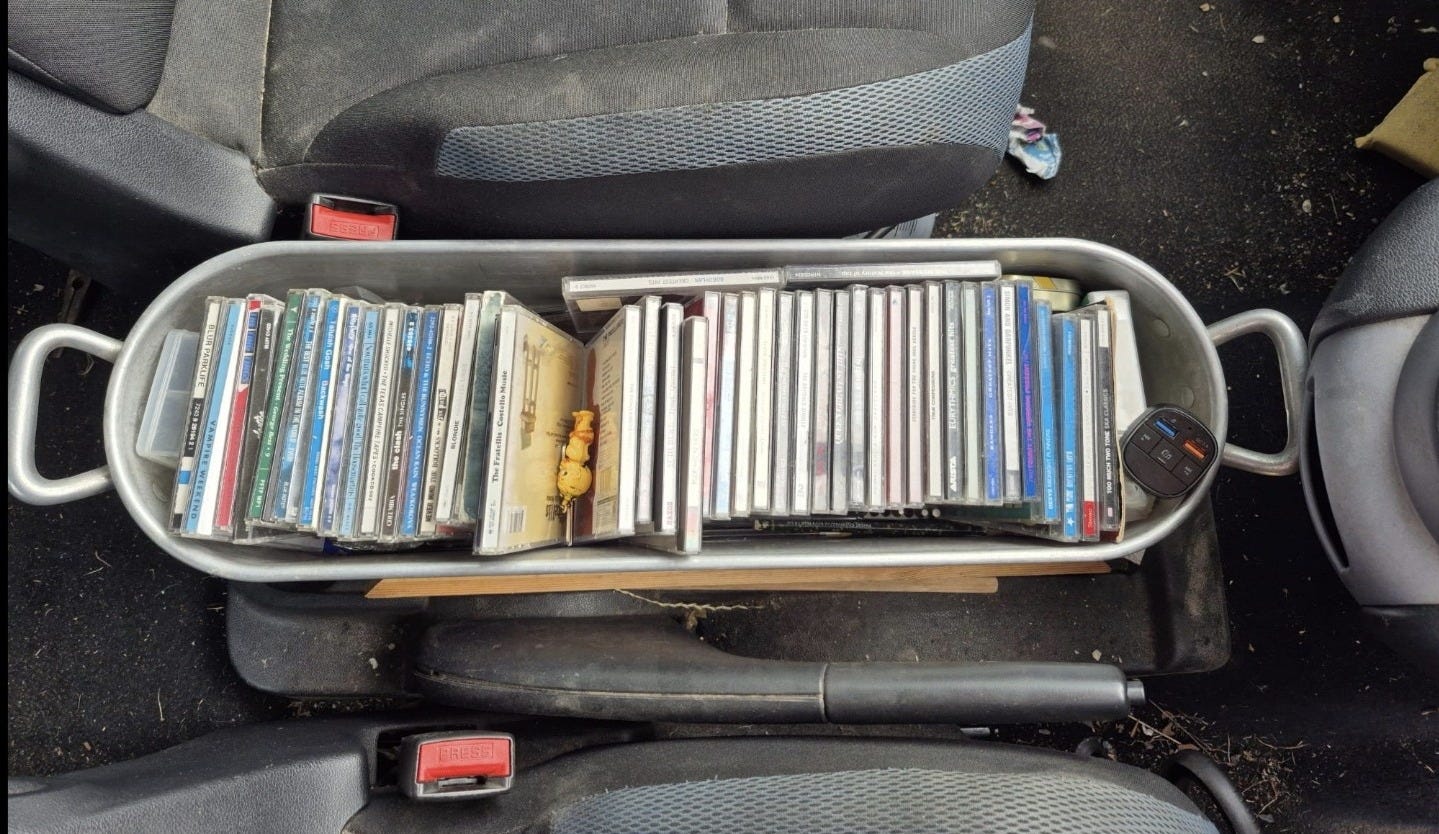Path dependency, bangernomics, and trees of destiny (policy lessons from the sudden death of Baby Blue)
We lost a much loved family member in August - relax, Baby Blue was only a car. Can I squeeze public policy lessons from this? Only a tree could stop me.
You may think that my blogs are generally a bit of a car crash - this one really is1,2.

i. Preamble - change is a pain
In real life and in public policy land, change is hard. For most of us there are incentives to ‘keep on keeping on’. It is easier to tinker at the margins of established strategies, organisations, and investments, rather than fundamentally question their utility or effectiveness, and suggest ripping it up and starting all over again.
Change is a pain.
Path dependency builds its own momentum. Like the ancient rock band of the same name, the status quo has a bewildering number of enduring fans.
Then sh*t happens and a crisis necessitates a fundamental rethink.
Pick a crisis
For many in the global development world, the aid-pocalypse is the catastrophic crisis.
However, for others (including me) the last year of youth discontent bubbling over into public protest, met by state violence, signals something more significant.
This is a rolling hard reminder that ‘our’ collective efforts (in public policy, government, democratisation, aid) to incrementally develop a virtuous mesh of stronger democracies, development, openness, growth, and greater opportunity (jobs! jobs! jobs!) did not work well enough, or deliver all we promised.
The symptoms are not minor. This summer, supposedly Open Governments were opening fire on their own young people. I had already lost patience with the transparency and openness bandwagons that felt more and more like self justifying ends in themselves, rather than the (less and less convincing) means to real world change. I think openness has some intrinsic value, but that is not enough. We oversold it on the basis of instrumental benefits.
Much global openness has a what looks like strong path dependency - hold steady! keep the faith! we just need another round of funding for transformative change to flow. I get asked for ideas to counter democratic backsliding, but I find it hard to tie down what the hard metrics for democratic ‘frontsliding’ were in times of plenty.
Rant over - let’s talk car chases.
ii. So where is this going? RIP Baby Blue
So path dependency.
I was reminded of it when Baby Blue (BB from hereon), our ill suited and anachronistic family car of 11 years died an unexpected death in a reverse collision with a solid Welsh silver birch tree.
Mercifully we were not there at the time: we came back from a river swim to find a car that looked very much like BB parked at a 45 degree angle on the bank of a stream, gently hugging a silver birch tree. Some damp children were pointing at it. We joined them. Then realised it really was our car. Kind people said it was a handbrake fail, though this glosses over the human agency involved (a sin of omission). Tears were shed. Our friend Sam the farmer came and dragged BB out of the ditch. The insurance people were surprisingly kind - but structural damage meant BB was beyond repair.
BB before that tree…
We bought BB in a hurry when we moved to the UK from India. BB was second hand from the national accessible driving scheme. Clunky but BB reminded our daughters of the utilitarian French wagons that we had hired on previous UK visits3. Noisy but reliable. Embarrassing but dependable. Teenagers could hear BB approaching from afar, reassuring them that late night parental taxi services were incoming in the dark summer woods of rural Oxfordshire. Their friends asked what job I did that required ‘that cute van’. Perhaps a dealer in second hand furniture rather than a provider of nearly new analysis and pre-loved policy advice.
In BB we hedged our cultural bets - a Welsh dragon had our backs, a map of India in the side window, and silver Hanuman-ji hanging from the rear view mirror.
BB spent a decade largely laying idle, with minimum local travel (I was a train and bike commuter, then worked from home), but with occasional cross country epics loaded with tools, luggage, or student junk. North Wales, Edinburgh, Durham. On the eve of Covid lockdown, BB went to Edinburgh and back in a day: 800 miles.
BB had played dead before, but when parked at home. I swore each time that this was the last straw, but BB coughed back to life and inertia (our inertia) saved it (nearly made BB female there). In UK slang, BB was a ‘banger’ (an old, unreliable car in poor condition, often considered worthless or a "rust bucket").
Everyone was used to being driven in BB, but no-one else enjoyed driving BB. Slow, filthy, dented, but kept going. A shed on wheels - when we emptied BB so the scrapper could take BB away we were amazed by what was lost in the nooks and crannies. BB had a manual (stick) gearbox which was one reason why only I enjoyed the driving. There may be a gendered dimension to this story. A mobile man cave, though BB was hardly the dream machine of toxic masculinity.
BB came with a CD player but nowhere to put CDs - until I found that a ‘fish kettle’ (for poaching a whole salmon) in an Oxfam shop was the perfect size to hold CDs between the front seats. I was proud of how functional yet stupid this looked. I hoped that someone would one day see it and cry जुगाड़4. A lot of the CDs were in the wrong box so I was the only expert who knew how to operate the system. Like a bespoke software ‘solution’ that needs a perpetual consultancy contract to operate it on behalf of a public body - I controlled the music.
Home policy making - a battle of ideas as well as actors and interests
Plans to replace BB - even go electric - always stalled. Perhaps there was a Lack of Political Will (LoPW) to implement much needed reform (huh! no way - it was active political won’t).
As well as indecision, inaction was partly because ‘evidence informed policy advice’ came from two opposing lobbies.
On one side was the London-centric ‘go electric’ Guardian reading intelligentsia. They can afford the up-front cost of a small electric car but did not drive to Scotland and back once a quarter, or cosplay as a vegetarian sheep farmer.
The other lobby was ‘Bangernomics’ - represented by my oily handed friend up the hill. What could be more environmentally friendly and economical than nursing an old car for as long and as cheaply as possible, and so saving it from the scrapheap? This was attractive as it dressed my prevarication as conscious strategy. My friend came and showed me how to do basic maintenance and repairs. He is a good teacher but I am a bad student. Path dependency meant I dabbled in amateur bangernomics through inaction. I talked a good game (when quizzed by visiting Londoners), though without much of the ‘cheap’. When teacher wasn’t looking I got the local garage to do my servicing and maintenance. I didn’t keep a note of the spiralling costs of keeping BB on the road. I know from my professional life that it is politically expedient to hide unsustainable subsidies.
So, in usual political economy style there was a set of interests (emotion, tradition, inertia, thin application of a probably compelling strategy) that sustained an equilibrium, path dependence, the status quo. We and BB might have rumbled on together for another decade, but fate (the Welsh tree ) had other plans.
Case studies versus independent evaluation
So why does BB remind me of a development programme or organisation?
Well, I can offer a happy range of positive case studies about Baby Blue (big enough boot to ferry a swan; 800 miles in a day; reversed right onto the dung heap and shovelled horse manure straight into the back) but an overall lifetime evaluation would report as overall negative. In old DFID annual review language a ‘B’ at best.
B - ‘moderately did not meet expectation’.
I would have to work hard to keep the report off the website for as long as possible.
Metaphors: how low can he go?
Would I dare try and extract a public policy metaphor out of this experience? I emailed a US friend about the eventful holiday in Wales. He replied:
‘The car bit sounds a little harrowing – I look forward to reading about it and its deeper meaning in a future blog’.
Yes, I am really that predictable.
iii) Path dependency and bangers in development
What examples do I have of public policy or organisations that merrily chug along like a diesel powered 2010 Citroen Berlingo, perhaps are a largely unquantified financial drain, with some glossy positive case studies (and social media content with smiling faces) but evaluated overall as a bit of a failure, yet stuck in path dependency with logic subsumed by the barnacles of emotion, the moss of organisational lore, the accumulated sediment of the expectation and entitlement of the people involved. Until unexpectedly reversing at speed into the tree of crisis. Perhaps with anachronistic subsidiary projects that don’t fit the overall strategy but someone thought they were a good idea - perhaps the ‘fish kettle CD racks’ of donor projects.
Here is my quick and dirty list of development bangers that rumble(d) along the highway of path dependency, belching fumes, eating funds, and almost certainly in need of a rethink. There are a few ‘I’m sorry but…’ statements here, but I think while we miss the way the development world used to be, we should avoid rose tinted spectacles and can still learn from critical analysis, even if uncomfortable.
Bangers
I hope that these are not all cheap shots. Feel free to suggest your own. Trees noted where obvious.
Banger 1: 30 years ago I worked with a big Indian NGO that offered a range of child-focused services to a large rural catchment. The weekly Thursday outpatient clinic attracted hundreds of families, and the queue snaked around the courtyard and up the road, with many waiting for hours. Prospective funders were always invited to visit on a Thursday. Many people suggested that offering outpatient clinics several times a week was surely a better option, but the boss was adamant - this is how we do it, and this is what the funders need to see. I hope that now we (collectively) do better. The growing body of work on dignity is one tree in the path of the performative poverty banger.
Banger 2: TVET (Technical and Vocational Education and Training) was a large, ubiquitous, rolling investment for decades. It promised lots and chugged away, consuming funds and eating young people’s dreams, yet my understanding is that it achieved quite a bit less than it was supposed to in terms of jobs and employment and growth. And any positive results were dependent on context. This 2013 systematic review was a something of a tree in the road for TVET. Multiple organisations, experts and intermediaries kept the faith as if their lives depended on it. Well, their livelihoods did. And to a degree these activities keep on rolling. I still see policy recommendations that include generic skills training.
Banger 3: from the donor country office perspective, budget support in aid could be a bit of a a banger. In my worm’s eye view experience, the theory was far better than the practice, and there seemed to be pressure to demonstrate that it was working, and when the political tide changed there was pressure demonstrate that it had not worked. What was the tree? Perhaps the Daily Mail?
The days of peak aid also birthed some other approaches that rumble on and look a bit bangerish. I’ve had a few recent encounters with Results Based Financing, which (more than two decades since I was peripherally involved in trying and failing to design results based incentives) still seem better in theory than practice. Sector Wide Approaches (SWAPs) also roll on. This begs questions: if the earlier waves were successful (from mid 1990s onwards), wouldn’t this framing now be so mainstream that we could stop saying ‘SWAp’. If they were not successful (e.g. in disciplining deviant donors), why do we keep on trying and trying again? However, I can sympathise with this path dependence on repeat. I miss Baby Blue and idly look through Autotrader for a super cheap replacement…
Banger 4: Claims that development and poverty reduction will ‘address the drivers of migration at source’. These claims still keep coming out of the mouths of well meaning people that really should know better. The tree of evidence is too inconvenient.
Banger 5: The very sad end of USAID also terminated some long running bangers, with very strong path dependency and US exceptionalism - such as domination of US government aid by US based lead contractors and other intermediaries. Beltway bandit bangers. Serial reform efforts were thwarted by the bangers themselves. This great piece by Justin Sandefur from 2022 now looks like a message from bygone age. The UK version has been more subtle - proudly global open competition but with UK outfits peculiarly well equipped to win. That’s political economy for you.
Banger 6: I am sad for all those personally affected by the nose dive of the UN system into a budget hole, but at least my Berlingo did relatively few things and did them quite well. The UN fiscal abyss seems a lot like my Welsh tree of destiny. Some more critical thinking (over decades) about purpose and functions and efficiency might have been better than bloating and creating an expanding race of competing bangers in times of plenty. Let’s not do all that again.
Banger 7: The SDGs… I wrote a few rude words about the SDGs in a Blog a few months ago, and this got my biggest audience of the year. This was a wonky sample, but no-one jumped up to defend them. The SDGs now look a lot like a banger stuck in path dependency. Ken Opalo’s ongoing critique is a much needed tree of truth.
Banger 8: As a former civil servant I have huge respect for and emotional attachment to the idea of public service but am also aware how the culture and tradition of such organisations can cause a loss of focus, living on foundation myths rather than contemporary reality. Last year when considering the problems in, and reform options for, civil services in a range of countries in fiscal crisis (see above - protests more than aid cuts), I could not help but ask a basic question:
what is this civil service actually for?
There were few convincing replies from those within those systems - I think because of path dependency built up via the barnacles of tradition, complexity, prestige, regional and colonial legacy, political economy, elite bargain etc etc. This had created some civil service bangers of pretty monstrous proportions. However, I hope that the question led to some interesting and useful discussions of ways forward - perhaps a need to actually have an answer to this fundamental question, and use this to reboot norms, expectations, motivation for wanting to join a public service. Perhaps summarised in a new, crisp civil service code. I like the UK civil service code and enjoyed making colleagues uncomfortable by citing the code as a reason why we all have to take evidence seriously (yes, I was a deckhand in research and evidence).
Banger 9: Related to the civil service banger are the bangers of traditional capacity building. When we moved onto the ways of building a better civil service, in several countries the proposals were real diesel bangers - study tours and 5 day residential training.
Banger 10: State Owned Enterprises (SOEs). Years after I last worked on helping governments to reform (i.e. close, sell) them, I was surprised to see so many SOEs still chugging along - the state involved in all sorts of strange areas such as budget haemorrhaging airlines, hotels, plantations.
Banger 11: Better also mention the many military bangers, still over-reaching in their country’s economy. And actually spreading further, strangling the future as they do so.
Banger 12: I don’t closely follow the ESG industry any more but… it often feels pretty bangerish. Hit targets, tick boxes, miss point.
Banger 13: some big names in the field suggest that economics is suffering from path dependency and perhaps some bangernomics of the bad kind. This CGD blog (Is Research on Development Economics Serving Sub-Saharan Africa?) describes some ways that development economics might swerve to avoid trees. Ha Joon Chang takes on mainstream economics more generally (this interview tackles some questions that I long wanted to ask - but was too timid).
Banger 14 (fish kettle CD rack): projects that deliver bespoke digitisation of specific government functions in the vain hope that these will help catalyse transformation, or that bad record keeping is just a technical problem. I encountered a few of these bangers in revenue authorities last year - supported by bilateral and multi lateral funders. More than bangers - fish kettle CD racks!
Oh, and if your development organisation procured a financial management system that was adapted from warehouse management software, so that each time you record or make a transaction you need to put ‘1’ in the unit box (‘1 money’) and then put the financial value in another (‘£5,000,000’) then you may have yourself a fish kettle CD rack (don’t laugh - this particular banger dogged my employed life).
iii. Future bangers - things that cash should replace
A fleet of bangers on the horizon might be all of the things that are assessed to be less effective than cash transfers, covering similar intended outcomes by other means. For cash transfers, the route to scale must mean that they will be taken up by governments using funds that include own revenue.
In this process cash transfers should logically displace a range of long established services, transfers, and supporting architecture for food, training, agricultural support, and parts of local government, NGOs and private companies that are long established wheels in this ‘non cash’ delivery machine. Of course closing down programmes and policies needs care and nuance, and awareness of the risks of unintended consequences, and vulnerable people and regions falling out of the system. However, it would look like a veritable rush hour jam of bangers if vested interests and path dependency meant that all of these things trundle on, in parallel with ever expanding cash.
iv. Reflection - path dependency
This blog is a bit silly but I hope that it touches on something relevant - the need to occasionally ask ourselves why do we do things this way? Challenge is good - even if it causes discomfort. Change is a pain, but may be worth it, particularly when we are spending someone else’s money, or failing to deliver all that we promised to the people we profess to care most about.
However, I don’t mean to encourage people to complain and disrupt incessantly, and make the same criticism or complaint in every meeting. From experience, they are usually clearer about what they don’t like than suggesting something better. Breakers not makers.
I like the old civil service norm of there being a time for heated debate, brainstorming, disagreement, but then you draw a line, and all put a shoulder to the boulder.
But also make time down the track for real challenge, and be open to the risks of path dependency. Ideally before you hit a tree.
Postscript: A regular reader of this Blog bought an old car from me nearly 20 years ago. If he reads this, I hope it was bangernomics of the good kind.
Come for the blog, stay for the footnotes…
Thanks to Duncan Green for this opening line. His joke is a banger - in a good way.
Adapted from Schematic Representation of a Path-Dependent Process. Source: Rosenbloom, Meadowcroft, and Cashore, “Stability and climate policy? Harnessing insights on path dependence, policy feedback, and transition pathways”, Energy Research & Social Science, No 50 (2019): 171
We rented a Renault Kangoo because we were late and it was the only car left to hire. We hired the same car again the following year (emotion), and then bought something remarkably similar because the Kangoo had been discontinued. Path dependency.
https://en.wikipedia.org/wiki/Jugaad Jugaad or jugaar (Hindustani: जुगाड़ / جگاڑ jugāṛ) is a concept of non-conventional, frugal innovation on the Indian subcontinent.[1] It also includes innovative fixes or simple workarounds, solutions that bend the rules, or resources that can be used in such a way. It is considered creative to make existing things work and create new things with meagre resource




